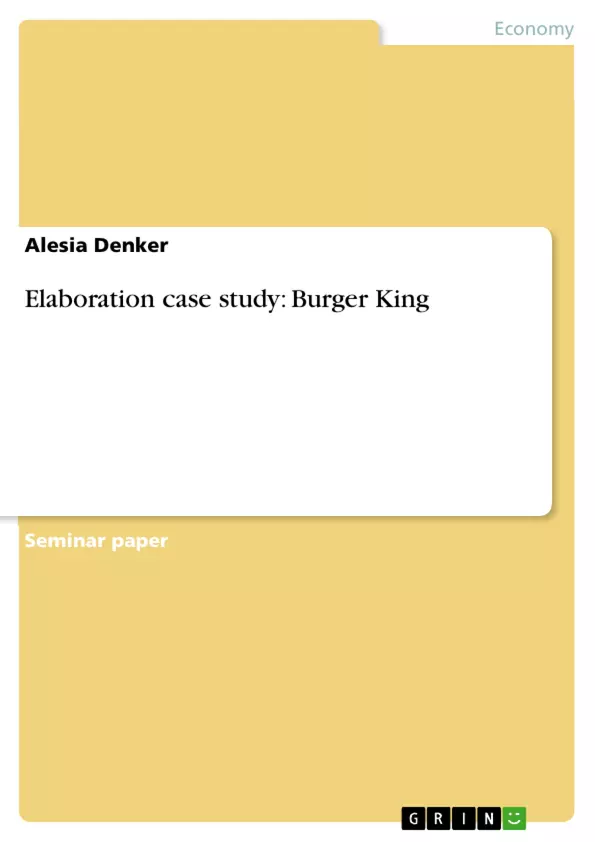Burger King Corporation (BKC) is a Florida corporation based in Miami. BKC
operates and grants franchises to operate quick-service hamburger restaurants
using certain trademarks, service marks and trade names and procedures for
inventory control and management.
Franchise Offer: There are 3 types of franchises offered:
Institutional Locations: "Institutional locations" include government buildings
and facilities, medical facilities, airports, train and bus stations, sports facilities,
factories, corporate campuses, turnpikes, limited access toll roads, theme
parks, zoos and educational facilities.
Traditional Burger King Restaurant Facility: A self-contained, full size Burger
King Restaurant which is located and operated on a site as a freestanding
building or within another building structure such as a shopping mall. A
Traditional Burger King Restaurant does not share any common areas with any
other businesses and serves the standard approved menu for Burger King
Restaurants.
Non-Traditional Burger King Facility: A Burger King Restaurant may be
located at a site which includes other businesses, such as retail, food service,
gas stations, convenience stores, other franchised businesses or restaurants or
other similar facilities.[...]
Table of Contents
- 1 Business description
- 2 Initial Investment
- 3 Franchise Agreement
- 4 Advantages and disadvantages of Burger King as franchise system
- 5 Burger King
- 5.1 Burger King general informations
- 5.2 International expansion of franchise
- 6 Why Russia?
- 6.1 Russian Restaurant Industry
- 6.2 Russian Fast Food Market
- 7 Timing - Strategy
- 8 Opportunities in Eastern Europe
Objectives and Key Themes
The objective of this case study is to analyze Burger King Corporation (BKC) as a franchise system, examining its business model, investment requirements, and international expansion strategies, with a specific focus on the potential of the Russian market. The study explores the feasibility and challenges of establishing a Burger King franchise in Russia.
- Franchise Model Analysis: Examining the different franchise options offered by BKC and their associated costs.
- International Expansion: Investigating BKC's global presence and strategies for entering new markets.
- Market Analysis: Assessing the Russian restaurant and fast-food market's potential and challenges.
- Investment and Financial Considerations: Evaluating the financial requirements and potential returns of a BKC franchise.
- Strategic Timing and Opportunities: Exploring the optimal timing for market entry and identifying key opportunities in Eastern Europe.
Chapter Summaries
1 Business description: This chapter introduces Burger King Corporation (BKC), a Florida-based company operating and franchising quick-service hamburger restaurants. It details the three types of franchises offered: institutional locations (government buildings, medical facilities, etc.), traditional freestanding restaurants, and non-traditional locations integrated within other businesses. The description sets the stage for understanding the diverse business model employed by BKC and its adaptability to different market conditions.
2 Initial Investment: This chapter provides a detailed breakdown of the initial investment costs required to establish a Burger King franchise. Using a table, it outlines a range of expenses, from franchise fees and travel costs to real property charges, construction, equipment, and working capital. The significant variation in cost between the low and high estimates highlights the factors influencing the total investment, such as location and the scale of the restaurant. This analysis is crucial for potential franchisees to assess their financial capacity and plan accordingly.
Keywords
Burger King, Franchise, Fast Food, International Expansion, Russia, Market Analysis, Investment, Franchise Agreement, Restaurant Industry, Eastern Europe, Financial Feasibility.
Burger King Franchise in Russia: A Case Study - FAQ
What is the purpose of this case study?
This case study analyzes Burger King Corporation (BKC) as a franchise system, focusing on its business model, investment requirements, international expansion strategies, and the potential of the Russian market. It explores the feasibility and challenges of establishing a Burger King franchise in Russia.
What are the key themes explored in this study?
The study examines several key themes, including franchise model analysis (different franchise options and costs), international expansion strategies (BKC's global presence and market entry strategies), market analysis of the Russian restaurant and fast-food sector, investment and financial considerations (financial requirements and potential returns), and strategic timing and opportunities in Eastern Europe.
What are the different types of Burger King franchises?
BKC offers three types of franchises: institutional locations (government buildings, medical facilities), traditional freestanding restaurants, and non-traditional locations within other businesses. This variety allows for adaptability to different market conditions.
What are the initial investment costs for a Burger King franchise?
The case study provides a detailed breakdown of initial investment costs, including franchise fees, travel costs, real property charges, construction, equipment, and working capital. The total cost varies significantly depending on factors like location and restaurant scale.
What is the focus on Russia in this study?
The study specifically analyzes the potential of the Russian market for a Burger King franchise. It includes an assessment of the Russian restaurant and fast-food market's potential and challenges, aiming to determine the feasibility and challenges of market entry.
What aspects of the Russian market are considered?
The analysis considers the Russian restaurant industry as a whole and specifically the Russian fast-food market, examining its characteristics and potential for growth within the context of a Burger King franchise.
What is the significance of strategic timing in this context?
The study explores the optimal timing for market entry into Russia, considering various factors and identifying key opportunities in Eastern Europe more broadly. This involves analyzing market trends, competitive landscape, and economic conditions.
What are the key takeaways from the chapter summaries?
The chapter summaries provide a concise overview of the key information presented in each chapter, allowing for a quick understanding of the core elements of the business description, initial investment costs, and the overall feasibility of the venture. These summaries highlight the key findings and their implications for potential investors.
What are the keywords associated with this case study?
Key words associated with this study include Burger King, Franchise, Fast Food, International Expansion, Russia, Market Analysis, Investment, Franchise Agreement, Restaurant Industry, Eastern Europe, and Financial Feasibility.
- Quote paper
- Alesia Denker (Author), 2011, Elaboration case study: Burger King, Munich, GRIN Verlag, https://www.grin.com/document/184536



